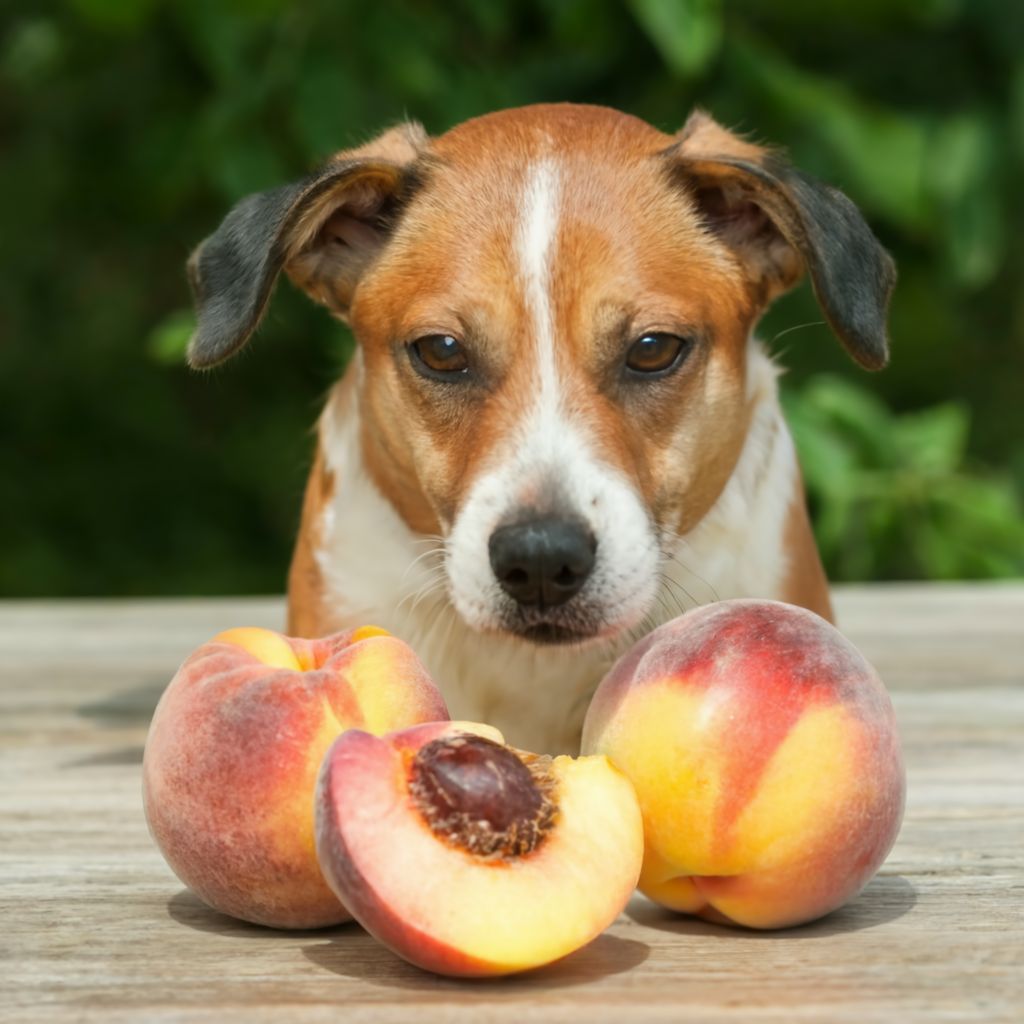Can Dogs Eat Peaches? Everything You Need to Know

Can Dogs Eat Peaches?
During the summer months, peaches are a popular choice among many people due to their juicy and flavorful taste. But can dogs enjoy them too? The answer is not a simple yes or no. Peaches may not be toxic to dogs, but there are a few things you should keep in mind before bringing them outside. Let’s consider whether peaches are safe for dogs and how to responsibly offer them.
Can dogs eat peaches?
Dogs have the liberty to consume peaches, but it must be moderately and cautiously. While the pit or seeds inside peaches are not toxic to dogs, they can still be dangerous if eaten. This is because peach stones contain a compound called amygdalin, which can release cyanide when metabolized. So when you give your dog a peach, be sure to remove it first. Peaches are a recommended addition to dogs’ diet as an occasional treat, as they can cause stomach upset when consumed in large quantities. Keep an eye on your dog’s diet when you introduce new food and for any potential allergies or digestive issues.
Can dogs have peach pits or seeds?
No, dogs should not have peach seeds or seeds. When peach stones are metabolized, amygdalin can release cyanide. Dogs (and humans) may suffer severe health problems or death from consuming peach stone, which is also toxic. Always remember to remove the stones or seeds from peaches before giving them to your dog.
Can dogs have canned or cooked peaches?

In general, it is not recommended to give canned or cooked peaches to dogs. Although the fruit itself is not harmful to dogs in moderation, canned or cooked peaches often contain added sugars, syrups, or other ingredients that can be harmful to dogs. Additionally, cooking can sometimes reduce the nutritional value of fruit. Your dog should be given fresh, uncooked peaches after removing the pit and other toxic components. Always talk to your vet before adding new foods to your dog’s diet.
Can dogs eat peach yogurt or other peach-flavored treats?
Be careful when feeding your dog peach yogurt or other peach flavorings. While small amounts of plain yogurt can be safe for dogs and even healthy due to its probiotic content, flavored yogurts often contain added sugars, artificial sweeteners, and other ingredients that are harmful to dogs. Moreover, some dogs may not be lactose-tolerant and consume dairy products such as yogurt without any food to digest which can lead to indigestion.
When it comes to peach flavoring, it’s important to read the ingredients carefully.The commercial peach-flavored products, such as sweets or snacks, are often artificially flavored, sugary, and contain harmful additives that can be dangerous for dogs. Always choose natural dog-friendly treats and snacks, or consider making homemade treats with fresh, dog-safe ingredients.
Are there any health benefits to feeding peaches to dogs?
Yes, eating peaches in moderation can have health benefits. Peaches are a good source of vitamins A and C, which are good for your dog’s immune system, skin health, and vision. Additionally, fiber is present in them, which can assist with digestion and regulate bowel movements. Additionally, peaches are also low in fat and calories making them healthy, low-carb options for dogs – especially those trying to stay trim.
However, it is important to remember that although peaches can be healthy, they should. only give to dogs in moderation. and then after removing the pit and other harmful parts. The consumption of too much fruit can cause indigestion in dogs, so they should only be given as an occasional treat and not as part of their diet. Always check with your veterinarian before introducing any new foods to your dog, especially if it has health conditions or restrictions.
What are the risks of giving peaches to dogs?

While peaches are a healthy choice for dogs, they may pose risks if given in small amounts.
- Cyanide poisoning: The pits or seeds of peaches contain a compound called amygdalin, which can release cyanide when metabolized.Peach stone can cause fatal cyanide poisoning in dogs.
- Indigestion: Too much fruit, including peaches, can cause indigestion in dogs.The manifestation of this can include vomiting, diarrhea or abdominal pain.
- Allergic reactions: Some dogs may be allergic to peaches or sensitive to certain components of the fruit.Anger symptoms such as itching, hives, swelling or breathing difficulties can be the cause of various types of reactions.
- Obstruction Hazard: The hard and fibrous nature of peach skin can pose a risk of gastrointestinal obstruction when consumed in large pieces. This is especially true if the dog eats pits or seeds, which are even harder and more digestible.
- Pesticide residues: If peaches are not organic, they may contain pesticide residues that can be harmful to dogs. Washing fruit thoroughly before offering it to your dog can reduce this risk.
How should peaches be prepared for safe consumption by dogs?
- Wash thoroughly: Wash the peach under cool running water to remove any dirt, debris, or pesticide residue from the skin.
- Remove pit and seeds: The pit or seed inside a peach contains compounds that can be harmful to dogs, including cyanide. Carefully cut the peach in half with a knife and remove the pit. Be sure to discard the pit and seeds as dogs should not ingest them.
- Cut into bite-sized pieces: Cut the peach into small bite-sized pieces that are suitable for your dog’s size. This makes it easier for your dog to chew the fruit and digest it safely.
- Serve in moderation: Offer your dog prepared peach pieces in moderation. Although peaches can be a healthy treat for dogs, they should only be given occasionally and as part of a balanced diet.
- Watch for reactions: After feeding your dogs peaches for the first time, watch them closely for signs of allergic reactions. or indigestion. If your dog experiences any side effects, stop eating peaches and contact your veterinarian.
By following these guidelines, you can safely prepare peaches as an occasional treat for your dog. Always remember to remove the pit and seeds before serving peaches to your furry friend.
Before introducing any new food to your dog’s diet, it’s a good idea to consult with your veterinarian. Your dog’s health, size, weight, and dietary requirements can be taken into account when seeking advice from them. Additionally, it’s important to be aware of potential choking hazards — unpopped kernels,
